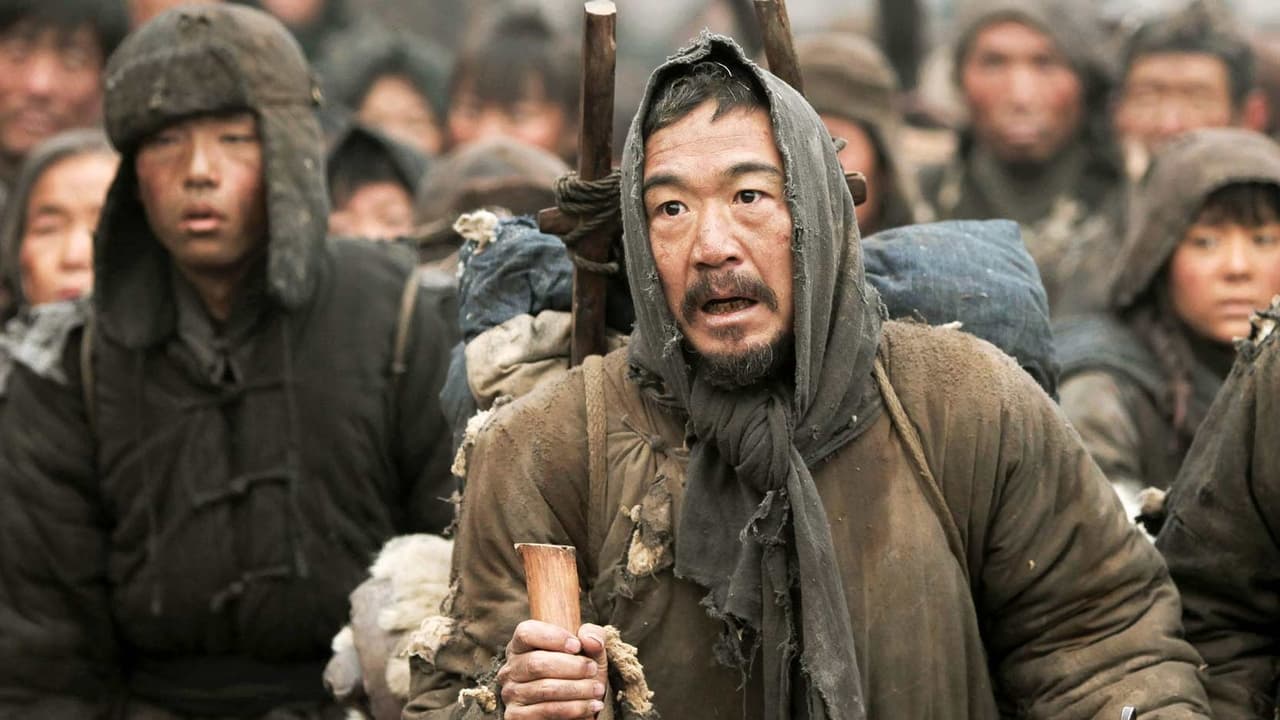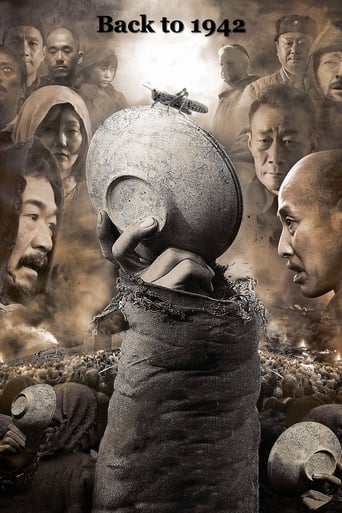

Am I Missing Something?
... View MoreAbsolutely brilliant
... View MoreGo in cold, and you're likely to emerge with your blood boiling. This has to be seen to be believed.
... View MoreI think this is a new genre that they're all sort of working their way through it and haven't got all the kinks worked out yet but it's a genre that works for me.
... View MoreOkay, first off, how can this rate 6.9 when by far the majority were 8 and higher...? Guess I could check my math but... gosh...Next,a capsule statement: This is Chinese culture. This is something you'll never truly understand. But you should really try...I have lived here in China a fair number of years (I'm Canadian). I'm still fumbling with understanding the culture. I mean a deep understanding, not Western superficiality. Try and recall, it's a culture of 5000 years, give or take. Western culture is sliver in comparison. Why? Because we in the West do not now live like the Greeks nor the Romans. Why? Because those cultures died. Sure, there are remnants, but sorry, they are freaking gone. But, the Chinese remain, contiguous, continuous, they never died. No one seems to 'get this'...The world's oldest continuous culture. The West can't comprehend this.Old culture is like 1970...Moving on, it appears to me most professional reviewers (I use the term lightly) continue to judge Chinese movies in the context of Western cultural perspective. I suppose they believe that having thought theydeciphered French and German cinema, they now know the Chinese. Wrong again. No surprise frankly.Chinese culture is so vast and so unfathomably deep, most will never truly understand unless you are born Chinese. It's called genetics.It's called nature and nurture. It's called socialization of the human psyche. And it's very very very old... Western civilization is an infant in comparison.But -- this is the greatest thing! It's called 'mystery'. It's roaming into a land undiscovered by yourself. Completely foreign. And then trying to piece together the meaning. It's like a treasure hunt.Frankly, I've watched a lot of Chinese movies, sub-titled and not, old and modern. And these have frustrated me beyond belief. Even angered me. Why were they so damn depressing was my first argument. At the end I felt like crap. But also, it made me keep thinking, wondering, exploring this conundrum. It angered me, but it made me feel. It made me feel something I hadn't ever felt before. And I know foreign cinema.This was different.It made me think. A lot. About history, about China, about human nature, about cultural differences, about art. About everything; about existence, life. Its essentials, its irony, travesty, betrayal, joy, hope, good, evil. The complex mess we call human. (I use the term loosely.) I just saw this movie for the first time, shame on me. I have worked and lived in China for seven years off and on... Anyway, I had to give it a 10 due to the 'other guy' (euphemism of for dork) gave it a '2' because it wasn't a 'leisure' film. I think this pretty much sums up the problems in today's world. It's called 'narrow-minded'. And that's another euphemism for a word I prefer not to write, being a gentleman an all.So, back to the point, another classical Chinese movie plot done with modern artistic verve. Classical as in almost everyone dies, anyone you thought was the hero dies, and no happy ending in the true sense. And yet done with a modern cinematic panache.And as I said, a deep-thinker's movie, with many unanswered questions.About life and living. About the true mysteries.Take a chance and give your brain a cultural work-out. I'm still out here on the playing field trying to learn. See you there...
... View Morethe bad: there is a lack of a decent plot, the movie is more an assembly of different episodes that happened during the famine, told through the eyes of a former landlord and his family. Unfortunately most (if not all) of these episodes are cliché' and predictable (there is a pregnant woman, guess when she will deliver; there is a girl with a cat, guess what will happen to the cat; there are corrupt officials out to buy women for their own pleasure, guess who they will buy;). The episodes told are so many that there is no time to sympathise for a character, or at least that was my feeling. Most scene are a brutal graphic depiction of what hunger is, but I found it less involving than, for example, Fires on the Plain. the good: the subject treated is historically important, especially the fact that the government was aware/unaware able/unable to do something to prevent this catastrophe. The action scenes (the bombing of civilians) are shot with mastery and makes you feel uncomfortable all the way through. What I found more interesting though (but haven't seen anybody pointing it out so far) is that Feng Xiaogang is indirectly (and very subtly, of course) criticising todays government. There are many parallels with what is happening now in China, the top leaders who lost touch with the people, corrupt officials who take money and women, foreigners who have to point out faults of officials, Chinese against Chinese with their insatiable hunger for wealth. Even the Japanese, though enemies, are depicted as more human than the Nationalist officials. The Ugly: Tim Robbin's role, or the whole religious part for that matter. It doesn't add anything to the, already thin, plot. Also why Christians and not Buddhists or Daoists?Overall it's an interesting movie to be watched, not only for the famine, but also as a new step for Chinese cinema becoming more international.6/10
... View MoreWith big budgeted films like Assembly and Aftershock under his belt, Feng Xiaogang is no stranger to ambitious films set against the Chinese historical backdrop, which he handles most excellently through powerful, emotional dramas, balancing it out with what would be money shots of the large event that forms the canvas of his movies. With Aftershock he dealt with the Tangshan earthquake of 1976, Assembly had his war between the Communist and Nationalist soldiers, and now he goes a little further back in time to 1942, where China's Henan province suffers through its deadliest drought resulting in the death of 3 million through starvation.I guess it's quite challenging for many here to have experienced true hunger in today's relatively affluent society, but those who have been through some days without having to eat something, usually through vanity reasons of keeping artificially slim, will attest to an uncomfortable feeling. Multiply that by months on end, with a war looming and then experienced, and one can almost picture how miserable life then would have been, with food being literally scraped from what would be unthinkable as food, such as tree barks, and many willing to offer anything, most often children, as barter trade for foodstuff.Based on the novel by Liu Zhenyun titled Remembering 1942, it charts the huge drought and famine through one of China's provinces, told through the eyes of various protagonists in this sprawling epic. There's a well to do landlord in Master Fan (Zhang Guoli) who opens the movie, as we bear witness to his slow and inevitable descend from prince to pauper, having a stockpile that got naturally targeted by bandits, and when all hell broke loose, he suffers tragedy after tragedy, joining the millions of others on their trek westwards to find food, and also incidentally escape from invading Japanese forces.Then there's the religious arc, with Priest Sim (Zhang Hanyu), a Chinese man seeing opportunity in all these distraught to spread the word of Christ amongst his fellow countrymen, with his faith being shaken by constant questions how his God would have allowed this to continue, where at one point he had envisioned this situation to be similar to Moses' leading of the exodus out of Egypt. Tim Robbins and Adrien Brody also took up roles in this film, much like Christian Bale in Zhang Yimou's The Flowers of War, with the former being the priest whom Sim confides in, and the latter playing the role of a Time magazine correspondent who also lends his perspective to the growing atrocities, and ignorance of the many politicians who prefer to enjoy the company of elites, and turning a blind eye to the true situation thousands of miles away.While the film does not offer pointed accusations, it does present a series of events that may have contributed to the immense human tragedy, and this largely involves politicians, soldiers and the Japanese, where WWII almost becomes an excuse for the existence of millions of refugees uprooting themselves and moving elsewhere not only to escape from enemies, but to look for sustenance. Director Feng engages some of the best in the craft for this ironically lush production (for a film that deals with those with absolute nothingness), to bring out vivid looking shots and conditions in which the actors thrived in delivering heartfelt performances, with no holds barred effort poured into the production to make every shot look believable, plausible, succeeding in its attempt to put you right where the action unfolds.War and battle scenes also looked notches above what the director had done with Assembly. Blood and gore moments were kept realistic without the need to be gratuitous, from major scuffles amongst bandits and villagers, to constant Japanese air raids which saw bombs raining down indiscriminately against both soldiers and the long lines of civilians trying their best to escape from hunger, now having to deal with another threat which some see as a lifeline to end their miserable lives. But if looking from yet another angle outside from the premise of the film, the narrative also deals with the adage of fortunes being cyclic in nature, telling such a story where a rich man's most prized possession will be that final slap in the face when Maslow's basic theory of needs come into play, like a warning to the newly affluent that when it boils down to survival, it's every man for himself, with the elite class likely to suffer the most when the people trodden upon calls it quits.Chinese films have come a long way over the last decade, and Feng Xiaogang has shown that he's amongst one of the best out there to deliver big budgeted productions that doesn't have to void of a soul or emotional core. It's an epic on the grandest scale, succeeding because it tells stories of the human condition that everyone can identify with. Highly recommended, as I ponder what other historical backdrop the director would be tackling next, since he has a keen eye and a knack for it!
... View MoreThis movie is excellent if you are wanting to learn more about the history of China (war and famine) but not so good if you simply want to view it for leisure. The whole film has no plot in particular. It only focuses on simply aspects like death, find food, starvation, killing etc. There are various disturbing scenes and lots of death scenes. If you can't understand fluent Chinese, I wouldn't suggest you view it. The language spoken is Chinese but with a unfamiliar accent/dialect. The subtitles may be hard to follow. the movie is actually pretty long but it doesn't have any plot. Overall, I didn't enjoy watching this movie,half of the time I was covering my eyes and ears. Too much battling and no interesting plot.
... View More